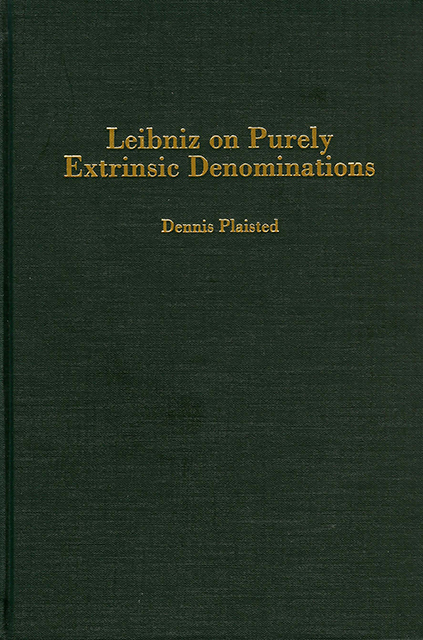Book contents
- Frontmatter
- Dedication
- Contents
- Acknowledgments
- Introduction
- Chapter One Two Views of Purely Extrinsic Denominations
- Chapter Two Truth and Purely Extrinsic Denominations
- Chapter Three Extrinsic Denominations and Where Accidents Are Allowed to Put Their Feet
- Chapter Four Extrinsic Denominations and the Interconnection of All Things
- Chapter Five Extrinsic Denominations and the Foundations of Relations
- Chapter Six Extrinsic Denominations and the Claim that Every Monad Expresses the Universe
- Appendix A Critique of Massimo Mugnai’s Version of NPE
- References
- Abbreviations
- Notes
- Index
- Frontmatter
- Dedication
- Contents
- Acknowledgments
- Introduction
- Chapter One Two Views of Purely Extrinsic Denominations
- Chapter Two Truth and Purely Extrinsic Denominations
- Chapter Three Extrinsic Denominations and Where Accidents Are Allowed to Put Their Feet
- Chapter Four Extrinsic Denominations and the Interconnection of All Things
- Chapter Five Extrinsic Denominations and the Foundations of Relations
- Chapter Six Extrinsic Denominations and the Claim that Every Monad Expresses the Universe
- Appendix A Critique of Massimo Mugnai’s Version of NPE
- References
- Abbreviations
- Notes
- Index
Summary
Leibniz says that one of his most important doctrines and, indeed, one of the most important doctrines in all of philosophy, as well as theology, is his doctrine that there are no purely extrinsic denominations (hereafter referred to as NPE). Unfortunately, despite his view of the importance of the doctrine, he nowhere offers an explicit statement as to what he meant by it. Nevertheless, on the basis of the way he employs the doctrine in various contexts and in the light of various other pronouncements by him which seem to be related to the doctrine, scholars have constructed interpretations of the claim. One such interpretation, which perhaps enjoys a modest consensus among interpreters, is that NPE is a claim that all extrinsic denominations reduce to intrinsic ones. For the moment, we may characterize extrinsic denominations as, roughly, relational properties and intrinsic denominations as non-relational properties. Thus, NPE, on the reductionist view, is that all relational properties reduce to non-relational ones. The sort of reduction these interpreters typically have in mind is that the truth of any extrinsic denomination that relates A to B can be inferred from the intrinsic denominations of A and B. The only sort of properties things actually have are intrinsic denominations; extrinsic denominations are not genuine properties of things, except in the derivative, reductionist sense just described. Critics of this interpretation have argued that the textual case for reductionism is inconclusive at best, and I share this assessment with them. However, to my mind, a satisfactory nonreductionist account of what Leibniz meant by NPE has not been offered. It is one thing to cast doubt on the reductionist understanding of NPE; it is quite another to explain, in a plausible non-reductionist way, what Leibniz did mean when he put forth the claim. My primary goal in this work is to provide such a non-reductionist account.
It is my contention that NPE, far from being a claim of the reducibility of extrinsic denominations, is actually an assertion that extrinsic denominations are genuine properties of the things they denominate. Specifically, NPE is the claim that there are no (true) extrinsic denominations of a thing that are not included in the concept of that thing. My interpretation of NPE thus essentially stands the reductionist reading on its head.
- Type
- Chapter
- Information
- Leibniz on Purely Extrinsic Denominations , pp. 1 - 2Publisher: Boydell & BrewerPrint publication year: 2002

